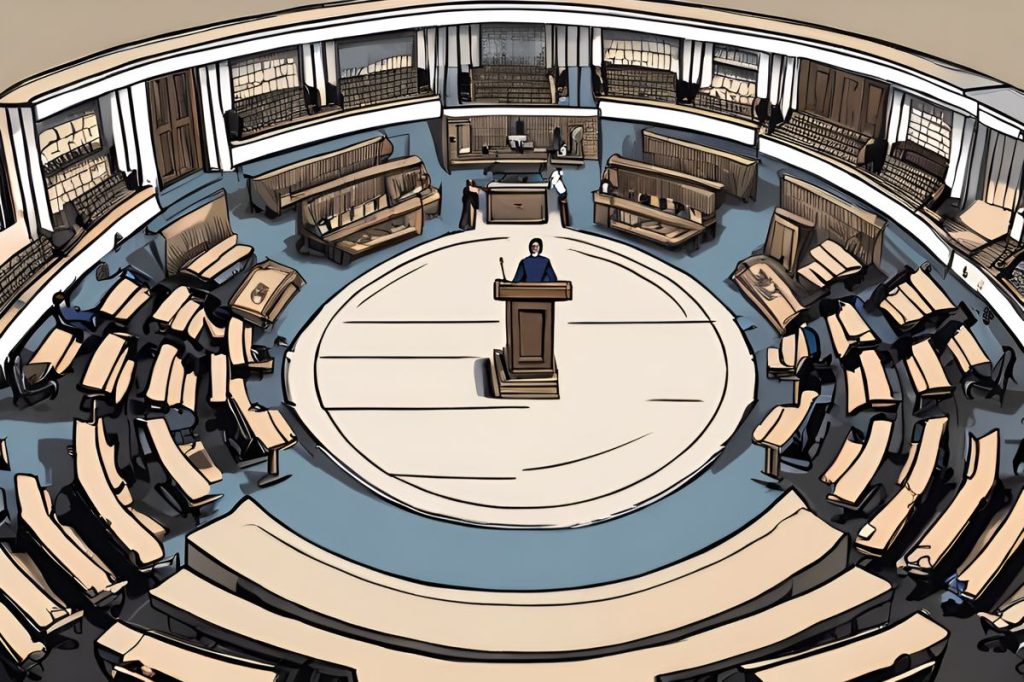The Northern Cyprus Parliament witnessed escalated tensions during a debate on the Cyprus problem, with Foreign Minister Tahsin Ertugruloglu’s skeptical stance towards international actors and historical grievances fueling heated exchanges among MPs. Near-physical confrontations ensued, highlighting the deep divisions and emotional intensity surrounding the longstanding island division.
What caused the escalation of political tensions in the Northern Cyprus Parliament?
The Northern Cyprus Parliament saw escalated tensions due to a heated debate over the Cyprus problem. Foreign Minister Tahsin Ertugruloglu’s skeptical stance towards international actors, historical grievances, and distrust played a role. Charged exchanges among MPs reflected deep divisions on resolving the longstanding island division, resulting in near physical confrontations.
A Heated Exchange Over the Cyprus Issue
Monday brought a significant stir to the atmosphere in the northern Cyprus parliamentary assembly as Tahsin Ertugruloglu, the foreign minister, discussed the enduring Cyprus problem. The session turned tumultuous, marked by exchanges among MPs that reflected the polarized views on the issue.
Ertugruloglu’s address was punctuated by interactions from members of the opposition and the ruling party alike. Tufan Erhurman, the leader of the opposition party CTP, criticized the foreign minister and the Turkish Cypriot leader Ersin Tatar. He accused them of allowing Nikos Christodoulides, the President, to appear as the advocate for a solution, questioning his genuine commitment to resolving the longstanding division of the island.
Historical Context and Distrust in International Actors
The debate then shifted towards historical grievances and distrust towards international organizations. Ertugruloglu expressed skepticism towards the European Union and the United Nations, citing past experiences that had shaped his stance. He narrated his participation in the European Union summit of 2002 in Copenhagen, spotlighting his refusal to endorse a proposal supported by then-UN Secretary-General Kofi Annan, which aimed at a federal solution to reunify Cyprus.
In a dramatic turn, Ongun Talat, a CTP MP and son of historical figure Mehmet Ali, accused Ertugruloglu of the ultimate betrayal by attending the summit with no intention of signing any agreement. This accusation escalated tensions further, leading to an uproar and near-physical confrontations among the parliamentarians.
The Assembly’s Turmoil
The session’s temperature reached its peak when CTP MP Ceyhun Birinci vociferously criticized Ertugruloglu, using a profanity that suggested grave harm to the nation. The charged remark caused MPs from both sides to stand, nearly leading to blows. The situation grew so heated that it took the intervention of other members, including UBP MP Sunat Atun, to restore order in the chamber. Tufan Erhurman requested that Birinci’s statement be stricken from the record, acknowledging Atun’s role in defusing the volatile situation.
The incident underscores the depth of division and emotion that the Cyprus problem continues to elicit among the island’s political leaders. The unresolved dispute has plagued the island for decades, with a buffer zone, patrolled by United Nations peacekeepers, separating the Greek Cypriot south from the Turkish Cypriot north since 1974. Various diplomatic efforts to reach a comprehensive settlement have been unsuccessful, with the last round of formal talks collapsing in 2017. The Republic of Cyprus is internationally recognized, except by Turkey, which recognizes the Turkish Republic of Northern Cyprus, declared only in the northern part of the island.
The future of Cyprus remains a contentious topic on the political agenda, often reigniting historical and nationalistic passions. As time passes, the challenge of finding a solution that satisfies all parties seems to become increasingly complex. The northern Cyprus parliamentary assembly’s latest episode is a testament to the emotional and political intricacies involved in the Cyprus issue, a matter with deep roots and wide ramifications, both regionally and internationally.
What caused the escalation of political tensions in the Northern Cyprus Parliament?
The Northern Cyprus Parliament saw escalated tensions due to a heated debate over the Cyprus problem. Foreign Minister Tahsin Ertugruloglu’s skeptical stance towards international actors, historical grievances, and distrust played a role. Charged exchanges among MPs reflected deep divisions on resolving the longstanding island division, resulting in near physical confrontations.
What historical grievances and distrust towards international actors were highlighted during the debate?
During the debate, Foreign Minister Tahsin Ertugruloglu expressed skepticism towards the European Union and the United Nations, citing past experiences that had shaped his stance. He narrated his participation in the European Union summit of 2002 in Copenhagen, where he refused to endorse a proposal supported by then-UN Secretary-General Kofi Annan, aimed at a federal solution to reunify Cyprus. This historical context and distrust towards international actors fueled tensions in the Parliament.
How did the session in the Northern Cyprus Parliament escalate to near-physical confrontations?
The session in the Northern Cyprus Parliament escalated to near-physical confrontations when CTP MP Ceyhun Birinci vociferously criticized Foreign Minister Tahsin Ertugruloglu, using a profanity that suggested grave harm to the nation. This charged remark led MPs from both sides to stand up, nearly leading to blows. The intervention of other members, including UBP MP Sunat Atun, was necessary to restore order in the chamber and prevent further escalation.
What is the background of the Cyprus problem and why is it a contentious issue?
The Cyprus problem stems from the longstanding division of the island since 1974, with a buffer zone separating the Greek Cypriot south from the Turkish Cypriot north. Diplomatic efforts to reach a comprehensive settlement have been unsuccessful, with the last formal talks collapsing in 2017. The unresolved dispute continues to elicit strong emotions and nationalistic passions, making it a contentious issue on the political agenda. The future of Cyprus remains complex, with the challenge of finding a solution that satisfies all parties becoming increasingly difficult.

